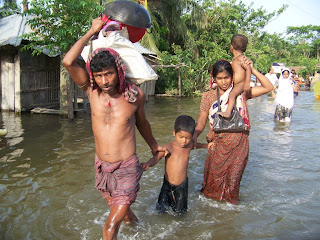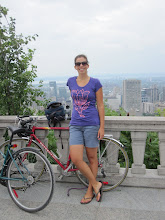I am becoming more and more familiar with Dhaka city. I have to admit that it is not without its challenges (which are only multiplied as a foreigner). Bangladesh is a densely populated country with 1090 people per square kilometre (Canada’s is 3.2 people per km2). But that’s not really a fair comparaison because most of our population doesn’t live in a large portion of the country’s land (like in the North for example). So let’s compare cities. Dhaka, the capital of Bangladesh, has a polupation density of 43,797.3 people per km2, Toronto (our most populated city) is 3,972 people per km2…so safe to say that the fact remains, it’s crowded here!


Despite the traffic and the people and the pollution, I was still offended when I read on the internet the other day that Dhaka was rated the 3rd worst city to live in the world. The BBC article dates from 2005 but I don’t imagine things have drastically changed since then. Apparently, this is because "many aspects of daily life present challenges"…I am not really living the daily life of most Bangladeshis so I can’t comment on whether this is true or not, but most of the people I’ve met here are very proud of their country and of its peoples’ achievements. I prefer to see this side of the story too.
On that positive note, here’s a cool fact: Bangladesh was one of the first countries to ban plastic bags in 2002. Imagine not seeing ANY plastic bags along the sides of the roads or hanging in trees!

When I initially arrived in Dhaka I was using the CNG (Concentrated Natural Gas) baby taxis to get to and from the NGO’s office. I liken the experience of riding in one of these to what it would feel like to be a character in a race car or karting video game. And like the characters in any video game, I’m participating in a game that someone else is controlling. I’m almost certain the CNG drivers think they’re in a video game too. They certainly seem to be trying to score points for getting to their destinations as fast as possible, while dodging obstacles coming at them from in front, behind, beside (or all three at once) at the very last second. I even hear a video game soundtrack playing in the back of mind when I’m riding in one. Luckily I don’t get motion sickness, and I find it best to take out a book and read rather than following the action on the road. I have had several drivers now laugh out at loud when they look in the rearview mirror and see my expression. However, the thought never seems to cross their mind to then be more cautious or to slow down…

After a little over a week, I switched to taking the public bus. Now this would not at all have been possible if my colleagues hadn’t told me which bus to take, where to catch it, where I should get off, when it comes (actually nevermind, there isn’t a schedule…) and how much it costs. But now that I’ve got the hang of it, it makes perfect sense. It’s much cheaper than a CNG and certainly more social. Foreigners don’t take the bus so I do get stared at, but I have also had some nice conversations with fellow passengers. They all pretty much follow the same script:
“What is your country?”
“Canada. What is your country?”
Confused expression “Bangladesh”…
Followed by any combination of “what are you doing here?” “where do you live?” “are you married?” “where is your husband?” “do you have kids?” "do you like Dhaka?"
But I really do enjoy these conversations. I spend my day with Bangladeshis (those working with Nijera Kori) but this gives me an opportunity to meet people who don’t work in the NGO sector, working people that are not at all involved in “development” and who are going to and from work or students heading to and from school. The bus is hot and crowded, and long (as mentioned above!), but I will miss (some parts) of the ride when I move closer to Nijera Kori’s office next week. And for the first time in my life I ran off of a moving bus! That was exciting!

As you can see, I have adopted the local attire. What I am wearing above is called a shelwar kamiz. It is a long shirt with baggy pants, and a scarf (dopatta). It's the first time I've ever done this on a daily basis, but it certainly has its advantages. First, it allows me to go unnoticed for about 2 seconds longer than normal. Second, it's comfortable. And third, it is well-suited to life here. Take for example the scarf. At first, I thought, "Why a scarf? It's much too hot!" But then I realized its utility. When it is hot (always), the scarf serves as a towel to wipe the sweat from my face. At night when mosquitoes come out, it allows me to cover my arms to prevent bites. When it rains, the scarf can be used as an umbrella. And finally, when I smell something bad on the street, the scarf is used as a mask to block out the odour. All in all, it's fantastic!
 [Post-cyclone Aila in Khulna Division]
[Post-cyclone Aila in Khulna Division]I was supposed to travel to Khulna (in the South West) to meet with landless groups there but cyclone Aila hit earlier this week, as some of you may have seen on the news. The villages I was planning to visit are severely flooded. People's houses have been destroyed and many crops swept away. It is really devastating. The people there are now waiting for the government to arrive with a machine to remove water from the villages (it's complicated but because of the industrial shrimp industry in that area, raised embankments were built to surround villages, and the villages are essentially sitting in holes in the middle of these so when flooding occurs the water remains trapped inside, stagnant).

I have uploaded some pictures that one of Nijera Kori's employees sent from the area. Given this situation, and the fact that people in these areas are extremely preoccupied at the moment, I will instead be traveling North to visit some groups there. Hopefully, the government will step in quickly and people will be resettled soon. Then I might visit a little later in the summer. You can imagine the health issues too. There is a lack of access to clean drinking water, so people get diarrhea. And with this stagnant water, cholera can spread very quickly and dangerously.
[Post-cyclone Aila in Khulna Division]
I will end here. I am leaving Dhaka Monday for 2 weeks and I will be without internet, so look for another blog after that. Khudahafiz from Bangladesh!









